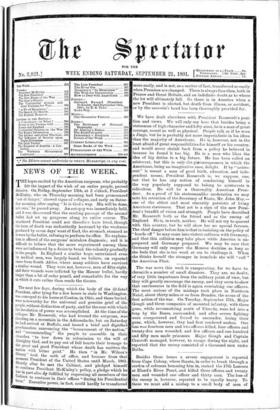The next few days, during which the body of the
ill-fated President, after lying for a few hours in state in Washington, was conveyed to his home at Canton, in Ohio, and there buried, were noteworthy for the universal and genuine grief of the people, without distinction of party, and for the ease with which the devolution of power was accomplished. At the time of the collapse Mr. Roosevelt, who had trusted the surgeons, was shooting on a mountain in the Adirondacks, but on Saturday he had arrived at Buffalo, and issued a brief and dignified proclamation announcing the " bereavement of the nation," and " recommending " the people to assemble in their churches "to bow down in submission• to the will of Almighty God, and to pay out of full hearts their homage to the great and good President whose death has smitten the nation with bitter grief." He then " in Mr. Wilcox's library" took the oath of office, and became from that moment President of the United States until March, 1905. Shortly after he met the Cabinet, and pledged himself to continue President McKinley's policy, a pledge which he has in part already fulfilled by requesting all members of the Cabinet to continue in their offices " during his Presidential term." Executive power, in fact, could hardly be transferred more easily, and is not, as a matter of fact, transferred so easily when Premiers are changed. There is always fuss then, both in France and Great Britain, and an indefinite doubt as to where the lot will ultimately fall. So there is in America when a new President is elected, but death from illness, or accident, or by the assassin's hand has been thoroughly provided for.






































